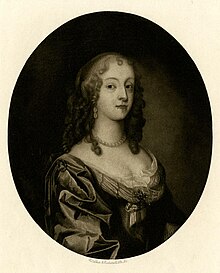John Suckling
Appearance

Nothing can make her:
The devil take her!

Some kind unbodied post
Sent from the shades below!


Sir John Suckling (February 10, 1609 – June 1, 1642) was an English Cavalier poet.
Quotes
[edit]Why So Pale and Wan, Fond Lover?
[edit]- Why so pale and wan, fond lover
Prithee, why so pale? - Will, when looking well can't move her,
Looking ill prevail?
Prithee, why so pale? - Quit, quit, for shame, this will not move:
This cannot take her.
If of herself she cannot love,
Nothing can make her:
The devil take her!- Aglaura (1638); Fragmenta Aurea (1646)
Other poems
[edit]- If I a fancy take
To black and blue,
That fancy doth it beauty make.- Of thee (kind boy) I ask no red and white.
- 'Tis now since I sat down before
That foolish fort, a heart,
(Time strangely spent) a year, and more,
And still I did my part:- 'Tis Now, Since I Sat Down Before.
- Oh for some honest lover's ghost,
Some kind unbodied post
Sent from the shades below!
I strangely long to know
Whether the nobler chaplets wear
Those that their mistress' scorn did bear,
Or those that were used kindly.- Oh! For some honest lover's ghost.
- Fragmenta Aurea (1646), Sonnets, III
- No grape, that’s kindly ripe, could be
So round, so plump, so soft as she,
Nor half so full of juice.- Ballad upon a Wedding.
- Her feet beneath her petticoat
Like little mice stole in and out,
As if they feared the light;
But oh, she dances such a way!
No sun upon an Easter-day
Is half so fine a sight.- Ballad upon a Wedding.
- Compare: "Her pretty feet, like snails, did creep / A little out, and then, / As if they played at bo-peep, / Did soon draw in again", Robert Herrick, To Mistress Susanna Southwell.
A Book of Quotations, Proverbs and Household Words (1924)
[edit]- W. Guerney Benham, A Book of Quotations, Proverbs and Household Words (1914), p. 351
- ’Tis expectation makes a blessing dear;
Heaven were not heaven, if we knew what it were.- Against Fruition. St. 4.
- They who know all the wealth they have are poor;
He's only rich that cannot tell his store.- Against Fruition. St. 5.
- Her feet beneath her petticoat
Like little mice, stole in and out,
As if they feared the light.
But oh! she dances such a way—
No sun upon an Easter day
Is half so fine a sight!- Ballad upon a Wedding. St. 8.
- See Herrick: "Her pretty feet / Like snails did creep."
- For streaks of red were mingled there,
Such as are on a Catherine pear
(The side that's next the sun)- Ballad upon a Wedding. St. 10.
- Her lips were red, and one was thin
Compared to that was next her chin,
(Some bee had stung it newly).- Ballad upon a Wedding. St. 11.
- Our sins, like to our shadows,
When our day is in its glory, scarce appear:
Towards our evening how great and monstrous
They are!- Aglaura.
- Why so pale and wan, fond lover?
Prithee why so pale?- Aglaura. Song.
- She's pretty to walk with,
And witty to talk with,
And pleasant, too, to think on.- Brennoralt.
- Her face is like the milky way i' the sky,
A meeting of gentle lights without a name.- Brennoralt.
- The prince of darkness is a gentleman.
- The Goblins.
- Compare: Shakespeare, King Lear, III, iv, l. 147.
- I thought to undermine the heart
By whispering in the ear.
External links
[edit]- Selected works at the Library of Toronto


